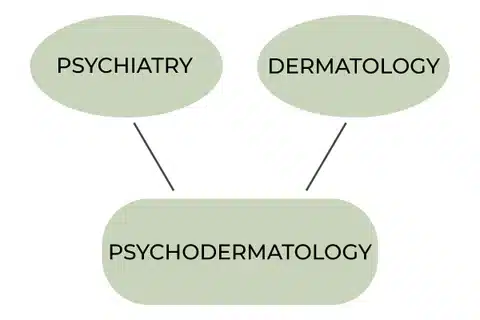Skin and mental health has been going hand in hand for a very long while. But the focus has been on acceptance in society based on beauty standards. With the progress of society towards a healthy mindset, we have found ourselves bound on another adventure. The association of dermatologists, psychiatrists, and psychologists is bringing the new dawn of a positive era.

Since the onset of humanity, it has been based on impractical criteria of lifestyle. Beauty standards were one of them. Even in this modern time of the 21st century, they have only been reduced, but not discarded.
The dilemma of maintaining standardized skin and having good mental health has rendered everyone restless. The healthy derma’s radar has been raised to an impractical level.
Psychological strain works on people suffering from any dermatological issue. It is a crisis of the globe where catching up with the trend and living accordingly is the only way of survival.
The fields of dermatology and psychiatry have come together to form an alliance to provide an explanation for the connection between skin and mind.
Psychodermatology
This new field explains the connection between skin and mind. It is from the field of psychosomatic medicine.
Skin is a sensitive part of the human body that reacts to both internal and external stimuli. The complex interplay between skin, neuroendocrine, and immune systems is what gave rise to this new discipline.

The action and reaction of and on skin depend on how it interacts with the stimuli. It is this process that created this new field of medicine.
Researchers from dermatology and psychiatry have found no exact reason for such reactions, but claim that 25% to 30% of skin diseases have a psychological connection.
As in the case of autoimmune skin disorders like Scleroderma, the reasons are based on gender, age, ethnicity and patient susceptibility. It is the stimuli that form the basis of the research of Psychodermatology.
Stimuli
The ongoing research has provided pieces of evidence that point toward the stimuli creating a ripple effect enhancing the immune, endocrine and nervous systems (both local and central levels). It is the main trigger that has to be identified to provide substantial ground for the cure.
The stimuli ranges from skin reactions from external factors to diseases within the body yielding external effects.

Psychological stimuli include stress, emotional imbalance, or other mental disorders; whereas non-psychological stimuli include autoimmune reactions, blood imbalances, etc.
The connection between psychological imbalance and skin disorders can easily go hand-in-hand as certain skin issues are symptoms of underlying mental health issues and vice-versa.
Atopic Dermatitis (AD) is one of the major skin diseases that has been found to dominate the negativity scale on a patient.
Atopic Dermatitis
Eczema defined by the symptoms of itchiness, redness, flakiness, and dryness of skin is a very common skin disorder. Despite it being prevalent and in most cases chronic, it is non-contagious.
The term Atopic Dermatitis is a whose term explains itself. It signifies inflammation of the skin. Although it is an incurable disease, it does produce a large amount of stress.

The stress of consistent feel of a diseased skin, the distorted look of the skin and the social stigma behind a non-contagious yet incurable disease leads to other multiple health issues.
AD can occur at any age to anyone. It is gender less disease, occurring mainly in children.
The adults of this kind of dermatitis suffer under the knife of psychological strains as the children; it is the magnanimity that will differ.
Similarity with Psoriasis:
The only visible difference between AD and Psoriasis is the edges. Examination of Psoriasis provides a clear thick edge whereas in AD such is not the case.
Symptoms of AD
The psychological symptoms include:
- Depression
- Difficulty with concentration
- Feeling overwhelmed
- Anxiety
- Mood swings
- Low self-esteem

The physiological symptoms include:
- Nausea or dizziness
- Lack of libido
- Sleeping too much or too little
- Aches and pains
- Muscle tension
- Bowel dysfunction (diarrhea or constipation)
The Psychology of dermatitis
The stress of any disease can lead to another mental or pathological unrest. There is no bound to the level of extremities.
Psychocutaneous disorders are being held under light to better understand the psychoneuroimmunology behind them. This is paving the way to provide better knowledge of pathogens, the course of the disease, and treatment planning.
Previously lacked by the evidential incentives in this discipline, researchers are now helping each other to be a better source of help to humanity.

The physiological imbalance was earlier assumed to be related to psychological imbalances, but now with detailed researches, we know that they occur simultaneously in many patients.
To provide better help for incurable diseases, the field of medicine and psychiatry has come forward and given rise to a much-needed new discipline. The research in this field will surely produce the positive effect that society needs.













